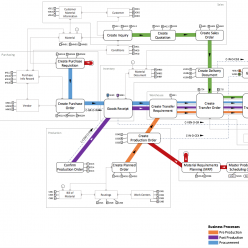When comparing ERP and MRP, usually an ERP integrate and share the different types of data it collects among different company departments. While MRP solutions are usually standalone programs dedicated to that purpose, so they are not designed to integrate with types of data not used in materials requirements planning.
ERP covers areas such as Accounting (nominal ledger, fixed assets, accounts sales/purchase ledger etc); Human resources (payroll, time sheets, training etc); Manufacturing (bill of materials, QC, managing the manufacturing process etc); Supply chain (stock control, purchasing, scheduling) ; CRM (sales and marketing, support and customer service); Project management (managing costs, time and activities); Data warehousing (document management)
While MRP systems focus on the processes from quote, sales, raising works orders, stock control, purchasing and all stages of manufacturing through to invoicing, but traditionally tend to exclude processes such as CRM and accounting.
Any system – MRP or ERP – needs to also provide security at user level to ensure that the right employees have access to the right information. Each and every section mentioned above needs the ability to either block access or provide read-only access.

Reference:
MRP Versus ERP http://sheetmetalworld.com/sheet-metal-news/17-it-for-manufacturing-management-and-production/11086-mrp-versus-erp
MRP vs. MRP II: What’s the Difference? http://www.softwareadvice.com/resources/mrp-vs-mrp-ii/
